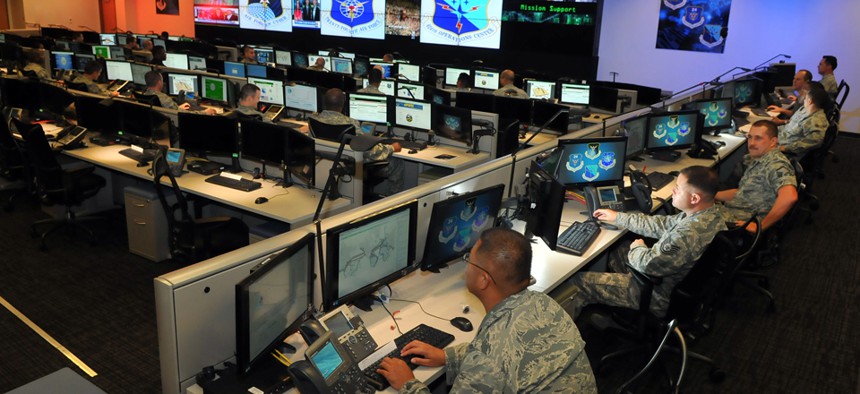Why Does the Air Force Spend Twice as Much to Hack than to Deflect Threats?

Personnel of the 624th Operations Center, located at Joint Base San Antonio - Lackland, conduct cyber operations. United States Air Force file photo
The service's cyber operations budget sheds little light on actual spending.
The House on Thursday approved legislation that breaks out $13.4 million for Air Force cyberattack operations and $5.6 million for efforts to defend the service's networks.
But those numbers likely underrepresent cyber offense and especially cyber defense spending, some military budget analysts say. The problem with cyber funding -- governmentwide -- is that it's hard to define what cyber is, they note.
"What they are splitting out here is really just a portion of what they are doing for cyber offense and defense," said Todd Harrison, director of defense budget studies at the Center for Strategic and Budgetary Assessments. "I think it's the part that's more focused on specific adversaries around the world."
The House’s version of the 2015 National Defense Authorization Act would spend a total of $67 million on Cyber Command offensive and defensive activities. The command oversees all Defense Department cyber operations.
"I expect that if you did a true accounting of what DOD is spending on cyber, it would be in the billions" of dollars, Harrison said.
The $5.6 million Air Force cyber defense number likely lowballs funding because the service, like nearly every Defense component, struggles to categorize cyber programs in that area, he said. Defensive operations include protecting military pay, accounting, and logistics systems, as well as websites and other servers and networks.
As for reserving $13.4 million for Air Force cyber strike activities alone, Harrison said, just a little tongue-in-cheek, "DOD can't do anything for less than $10 million.”
Armed Services Committee’s members applauded the Air Force for submitting a funding request that differentiated budget lines for offensive and defensive operations.
"The committee is aware that this was done to consolidate the funding activities in these areas into single program lines to allow for rapid technology development and deployment for offensive and defensive tools," they said. "The committee commends the Air Force for being proactive in consolidating its activities, providing transparency in oversight for Congress while also allowing for rapid acquisition on the part of the Air Force."
The Air Force's budgeting approach "is a model for program management and oversight” that should be “emulated by the other services and Defense agencies,” as much as possible, the lawmakers said.
NEXT STORY: NASA's new view of asteroids






